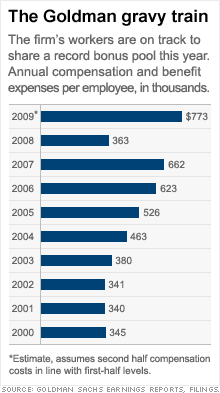Sonuvabitch. I guess they don't "get it."
Why is it that executives and senior employees in financial services rake it in every year? As Felix Salmon notes by way of Ryan Avent, such consistent payouts to traders are less an indication of excessive added value than they are a signal of an inefficient, failing market. The "innovations" of finance should be making the cost of credit intermediation lower, and astute outsiders should be flooding into the market to skim off some of that fat themselves. At least in a competitive market. Instead, we've seen hordes of astute outsiders (some of the best and the brightest of the past two generations, probably) move into financial services and yet everyone continues to pull down hefty rents. What gives?
For one thing, volume matters. Trillions of dollars slosh between the bank accounts of broker-dealers, investors, corporations, municipalities, and others every day. Taking only a few dollars -- even pennies -- here and there for these transactions is enough to add up to tens of billions of dollars per year, or more. This is the "flow" that earns a bank (and here I'm talking about the largest wholesale banks, not your local community bank) a consistent profit. These are precisely the kinds of trades that should benefit from innovation in other fields, namely information technology. Here's Felix:
Wouldn’t you expect...that financial companies would have become more efficient at intermediating between companies and investors? Shouldn’t it have been much easier and much cheaper to issue a billion-dollar bond in 1998 than it was in 1968?Surely enough players can jump into the broker-dealer market to drive the costs of clearing and settling trades down to miniscule amounts. But the financiers themselves would argue that it's not the technology that costs them, but rather the salaries and bonuses for the traders who sit on bond desks pricing bid-ask spreads and engaging in prop trading (not always a clear-cut distinction). Market-making requires skill, yes, but how much more than real rocket science? Every time the payment of exorbitant bonuses comes up, bank executives immediately seize upon the notion that their top talent will walk away at the first financial sleight, i.e. the first time they are paid for what value they add, rather than for "what they kill." Subtract out the massive government guarantee floating silently in the background, or the extensive network of systemic risk built up with all the OTC derivatives hedges, and "what they kill" begins to look a lot less impressive.
So what stops new firms from competing on the basis of price? The products banks trade may be heterogeneous, but the underlying skills and back-office technogy aren't. Why wouldn't investors and issuers go for a new institution or boutique that draws business away from competitors by offering lower trading costs and underwriting fees? Because no one would want to work there! Not if these same skills could be more highly rewarded elsewhere. They'd rather stick with the investment bank that pays them six figures or the private equity/hedge fund that pays them seven or eight. (Hell, the tax code even institutionalizes these relative pay differentials by treating some fund managers' earnings as capital gains rather than earned income.) And even if this "boutique" could lure away some traders willing to work for less, their brethren at the market-entrenched, too-big-to-fail dealers would still look like the better trading partners and counterparties to potential customers. After all, it's the big existing banks that dominate the market with their trading presence, existing base of asset management clients looking to put money to work, and 0% probability of being allowed to disappear any time soon.
All of this is to say that the bonus babies at some of our largest financial institutions should see their compensation "haircutted" down to levels that reflect their value-added; a level that is closer to engineers, doctors, and attorneys, if not less. Trading or underwriting $200 million of securities does not take twice as much intellectual skill as doing the same for $100 million of securities, so why is it compensated that way? Because market entrants would have to contend with the existing players that can't fail. Because this compensation is partly the monetization of government guarantees. And because there are always other institutional players -- some tax-advantaged -- that can afford to pay more the instant banks treat $200 million more like $100 million.
As I see it, the problem boils down to the nature of banking and finance itself. In particular, high levels of liquidity and low capital requirements allow credit to flow too easily relative to counterparty and systemic risk. A large amount of this credit goes toward making risky bets, paying off the gamblers, and making a given institution larger, more complex, and significantly too-big-to-fail. (Which is to say that strict limits on leverage and bank size can go a long way toward reforming the system). When all the cards tumble down, taxpayers step in to take the hit. Financiers can and will pay themselves ridiculous amounts until regulators, customers, and bank equity investors do something to stop it. But we've heard enough of their meritocratic horseshit. Their pay doesn't represent superior value, just their cut of the loot from a deregulated, inefficient marketplace.

No comments:
Post a Comment